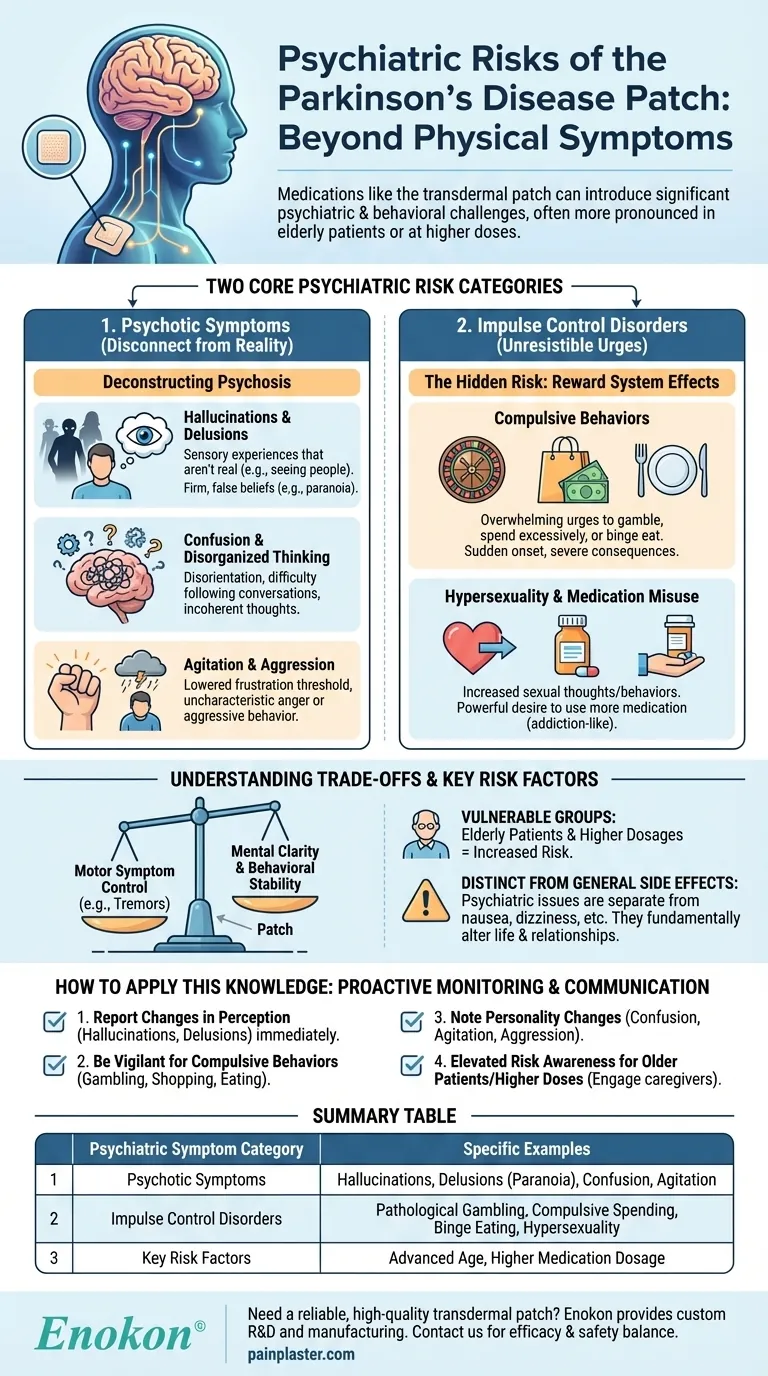Beyond the physical symptoms of Parkinson's disease, it's critical to understand that the medications used for treatment, including the transdermal patch, can introduce significant psychiatric and behavioral challenges. The patch can cause or worsen a range of psychotic symptoms, most notably hallucinations, confusion, paranoia, agitation, and disorganized thinking. These effects are often more pronounced in elderly patients or at higher doses.
The core psychiatric risks of the Parkinson's patch fall into two distinct categories: the emergence of psychotic symptoms like hallucinations and delusions, and the development of impulse control disorders, which manifest as uncharacteristic and compulsive behaviors.

Deconstructing Psychotic Symptoms
Psychosis is a clinical term for a state of mind characterized by a disconnect from reality. The Parkinson's patch, by stimulating dopamine pathways, can sometimes trigger these states.
Hallucinations and Delusions
Hallucinations are sensory experiences that seem real but are not, such as seeing people who aren't there. Delusions are firm, false beliefs that are resistant to reason, like a persistent, unfounded belief that one is being persecuted (paranoia).
Confusion and Disorganized Thinking
The patch can also lead to significant confusion or a state of disorientation. This can be coupled with disorganized thinking, making it difficult to follow a conversation or formulate coherent thoughts.
Agitation and Aggression
In some individuals, the medication can lower the threshold for frustration, leading to uncharacteristic agitation or even outright aggression. This represents a significant change in personality and behavior.
The Hidden Risk: Impulse Control Disorders
A separate but equally serious category of psychiatric side effects involves the inability to resist harmful urges. These are not signs of psychosis but are a direct result of the medication's effect on the brain's reward system.
Compulsive Behaviors
This can manifest as an overwhelming and unusual urge to gamble, engage in excessive spending, or binge eat. These behaviors can appear suddenly and have severe financial and social consequences.
Hypersexuality and Medication Misuse
The patch may also trigger an increase in sexual thoughts and behaviors (hypersexuality) that are out of character for the individual. Another manifestation is a powerful desire to use more medication than prescribed, which can be a form of addiction.
Understanding the Trade-offs and Key Risk Factors
While the patch can be highly effective at managing motor symptoms, it comes with a clear set of potential psychiatric costs. Awareness is the first line of defense.
The Role of Age and Dosage
The references clearly indicate that elderly patients are more vulnerable to experiencing psychotic symptoms. Likewise, the risk for all psychiatric side effects increases as the medication dosage gets higher.
Balancing Motor Control and Mental State
The fundamental trade-off is between controlling physical symptoms like tremors and rigidity versus maintaining mental clarity and behavioral stability. A side effect that is tolerable for one person may be unacceptable for another.
Distinguishing from General Side Effects
It's important to see these psychiatric issues as distinct from more common side effects like nausea, dizziness, insomnia, or application site reactions. While those are uncomfortable, the behavioral changes can fundamentally alter a person's life and relationships.
How to Apply This Knowledge
Proactive monitoring and open communication with your medical team are the most effective ways to manage these potential side effects.
- If you observe changes in perception: Immediately report any instance of seeing or hearing things that aren't there (hallucinations) or the development of strong, unusual beliefs (delusions).
- If you notice uncharacteristic compulsive behaviors: Be vigilant for new, intense interests in gambling, shopping, or eating, and discuss them with a doctor, as these are known impulse control issues.
- If there is a change in personality: Report any new or worsening confusion, agitation, or aggression, as these are significant warning signs.
- If you are an older patient or starting a higher dose: Be aware that your risk is elevated and engage family members or caregivers to help monitor for subtle behavioral changes.
Recognizing these potential changes is the first and most critical step toward safely managing Parkinson's disease.
Summary Table:
| Psychiatric Symptom Category | Specific Examples |
|---|---|
| Psychotic Symptoms | Hallucinations, Delusions (Paranoia), Confusion, Agitation |
| Impulse Control Disorders | Pathological Gambling, Compulsive Spending, Binge Eating, Hypersexuality |
| Key Risk Factors | Advanced Age, Higher Medication Dosage |
Need a reliable, high-quality transdermal patch for Parkinson's or other conditions? As Enokon, a bulk manufacturer of reliable transdermal patches and pain plasters, we provide healthcare and pharma distributors and brands with custom R&D and development expertise. Benefit from our technical know-how to create a product that balances efficacy with patient safety. Contact our team today to discuss your specific requirements.
Visual Guide

Related Products
- Capsaicin Chili Medicated Pain Relief Patches
- Far Infrared Heat Pain Relief Patches Transdermal Patches
- Icy Hot Menthol Medicine Pain Relief Patch
- Medical Cooling Gel Patches for Fever Cooling Patches
- Menthol Gel Pain Relief Patch
People Also Ask
- Can pregnant women use pain relief patches? Your Essential Guide to Safe Pain Management
- How do you apply the Signal Relief patch to find the proper placement? A Step-by-Step Guide to Maximum Relief
- What precautions should be taken with buprenorphine patches? Ensure Safe Use and Avoid Overdose Risks
- What side effects might occur from using capsaicin patches? Understand the difference between normal sensation and danger signs.
- Can children use the pain relief patch? A Critical Safety Guide for Parents
















